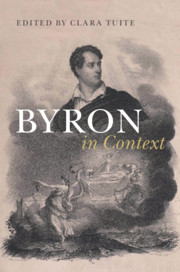Book contents
- Byron in Context
- Byron in Context
- Copyright page
- Dedication
- Contents
- Illustrations
- Contributors
- Chronology
- Abbreviations and Note on the Text
- Introduction
- Part I Life and Works
- Part II Political, Social and Intellectual Transformations
- Chapter 7 Politics
- Chapter 8 War
- Chapter 9 Greece’s Byron
- Chapter 10 Byron’s Italy
- Chapter 11 Orientalism
- Chapter 12 Religion
- Chapter 13 Natural Philosophy
- Chapter 14 Sexuality
- Chapter 15 Libertinism
- Chapter 16 Fashion, Self-Fashioning and the Body
- Part III Literary Cultures
- Part IV Reception and Afterlives
- Further Reading
- Index
Chapter 13 - Natural Philosophy
from Part II - Political, Social and Intellectual Transformations
Published online by Cambridge University Press: 04 October 2019
- Byron in Context
- Byron in Context
- Copyright page
- Dedication
- Contents
- Illustrations
- Contributors
- Chronology
- Abbreviations and Note on the Text
- Introduction
- Part I Life and Works
- Part II Political, Social and Intellectual Transformations
- Chapter 7 Politics
- Chapter 8 War
- Chapter 9 Greece’s Byron
- Chapter 10 Byron’s Italy
- Chapter 11 Orientalism
- Chapter 12 Religion
- Chapter 13 Natural Philosophy
- Chapter 14 Sexuality
- Chapter 15 Libertinism
- Chapter 16 Fashion, Self-Fashioning and the Body
- Part III Literary Cultures
- Part IV Reception and Afterlives
- Further Reading
- Index
Summary
Byron’s scientific context was no longer natural philosophy, but was not yet modern science. Through the eighteenth century, “natural philosophy” – traceable back to classical philosophia naturalis – had been the primary rubric organizing the investigation of natural phenomena. It was one of a set of English terms, including “natural religion” and “natural history,” that together positioned the study of nature as continuous with Anglican orthodoxy. “Science,” meanwhile, had a much wider field of reference than it does today. It named literate knowledge generally, and was often used synonymously with “literature,” which, prior to its Romantic-period redefinition as imaginative writing, likewise referred to all forms of knowledge communicated through the medium of letters. But from the late eighteenth century, just as “literature” was taking on a newly specialized meaning, “science” too was being redefined as the collective term for an emergent series of specialized disciplinary fields of research.
- Type
- Chapter
- Information
- Byron in Context , pp. 109 - 116Publisher: Cambridge University PressPrint publication year: 2019
- 1
- Cited by



